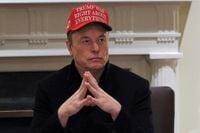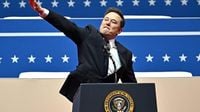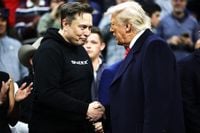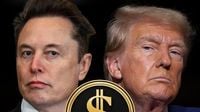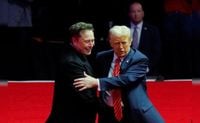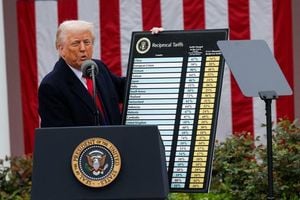In a stunning shift, Elon Musk is set to step back from his role in the federal government, a move that has sent ripples through Washington and the stock market. President Donald Trump has reportedly informed his Cabinet and close advisers that Musk, who has been serving as a special government employee overseeing the Department of Government Efficiency (DOGE), will transition out of his position in the coming weeks. This announcement comes amid growing concerns about Musk's influence and the backlash from his political activities.
Musk, who was initially scheduled to step down in May 2025, is now leaving earlier than expected, as Politico reported. This decision marks a significant change in the dynamic between Trump and Musk, who just a month ago was seen as a key ally in the administration. The abrupt shift follows Musk's recent involvement in the Wisconsin Supreme Court race, where he invested $20 million to support the Republican candidate, who ultimately lost.
During a Fox News interview, Musk expressed confidence in his work at DOGE, stating, "I think we will have accomplished most of the work required to reduce the deficit by $1 trillion within that time frame." As of April 1, 2025, the DOGE website claims to have saved $140 billion, although this figure has been met with skepticism due to past inaccuracies in reporting.
Trump's press secretary, Karoline Leavitt, dismissed reports of a rift between the president and Musk, labeling Politico's scoop as "garbage." She emphasized that both Trump and Musk had publicly agreed on Musk's departure once his work at DOGE was complete. However, the atmosphere within the White House has been fraught with tension, as Musk's management style and unpredictable behavior have raised concerns among Cabinet members.
One of the major controversies surrounding Musk has been his aggressive approach to slashing federal spending, which has led to significant layoffs and the termination of numerous contracts. His actions have resulted in a perception of him as a political liability, particularly following the defeat of the Wisconsin candidate he supported. Analysts have pointed to Musk's polarizing public image as a factor in the loss, with some suggesting that Democrats could use him as a rallying point in upcoming elections.
Despite the challenges, Trump has maintained a supportive public stance toward Musk. During a recent Cabinet meeting, Trump praised Musk, calling him "a patriot" and a "friend of mine." However, insiders report that Trump has also conveyed to his Cabinet that they are in charge of their respective departments, not Musk. This has led to speculation about Musk's future role, with some suggesting he might retain an informal advisory position.
As Musk prepares to exit the administration, he faces additional challenges in the business world. Tesla's stock has been volatile, with shares dropping sharply amid declining sales and increased scrutiny of Musk's political involvement. Reports indicate that Tesla's global vehicle deliveries fell 13% in the first quarter of 2025, which investors view as a direct consequence of Musk's dual roles in government and business.
Furthermore, Musk will have to navigate the implications of Trump's impending 25% tariffs on automotive imports, which are set to take effect on April 2, 2025. These tariffs pose a significant threat to Tesla, as many of its key suppliers are based in Mexico and China. Musk himself acknowledged the potential impact of these tariffs, stating on social media, "Important to note that Tesla is NOT unscathed here. The cost impact is not trivial."
In the wake of Musk's departure, political analysts are already speculating on how both parties will leverage his image in the upcoming midterm elections. A recent NBC News poll found that 51% of voters hold a negative view of Musk, while only 39% view him positively. This stark divide indicates that while Musk has significant influence within the Republican Party, he may also serve as a target for Democratic campaigns.
As the deadline for Musk's special government employee status approaches, expected to expire in late May or early June, the administration is preparing for his exit. Trump has indicated that he would prefer to keep Musk involved for as long as possible, but the practicalities of Musk's responsibilities at Tesla and his controversial presence in Washington have necessitated this transition.
While the official narrative suggests a smooth transition, many within Trump's circle are relieved that Musk's chaotic influence may soon diminish. His unpredictable behavior, including uncoordinated policy announcements on social media, has led to frustration among Cabinet members and has sparked internal disputes. Musk's abrupt proposals to cut agency budgets have often caught officials off guard, leading to a fraught working environment.
As Musk steps back from his role, it remains to be seen how his political and business endeavors will evolve. Despite the challenges he faces, he is expected to maintain close ties with Trump and continue to wield considerable influence in Republican circles. With the midterm elections on the horizon, both parties are likely to use Musk's image as a tool in their campaigns, shaping the narrative around him as they see fit.
In summary, Elon Musk's departure from his government role marks a significant turning point in his relationship with President Trump and the administration. As he prepares to return to the business world, the implications of his political involvement will undoubtedly linger, influencing both his companies and the broader political landscape.
